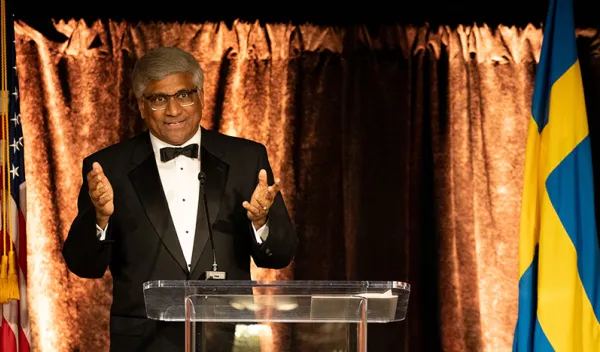
This week with NSF Director Panchanathan
NSF Director Sethuraman Panchanathan spent the week commemorating NSF's leading efforts in strengthening partnerships and supporting research empowering individuals and communities to promote a better, safer, healthier world.
On Tuesday, Nov. 12, Panchanathan joined the NSF Office of Small and Disadvantaged Business Utilization (NSF OSDBU) to present the NSF OSDBU Star award. The award recognizes NSF organizations for their exemplary service in advancing opportunities for small businesses to partner with NSF. This year's awardees, the NSF Directorate for Engineering and Office of Chief Information Officer, leveraged investments to strengthen individuals and uplift local communities that power and fuel the national economy.
On Wednesday, Nov. 13, the director attended the Embassy of Sweden's gala dinner to honor the 2024 American Nobel laureates at the House of Sweden in Washington, D.C. Panchanathan joined Swedish Ambassador Urban Ahlin to celebrate the astounding and transformative accomplishments of this year's winners, including seven laureates supported by NSF. In his remarks at the Nobel dinner, the director emphasized NSF’s crucial role in supporting fundamental research and continued efforts to grow its impact by expanding strategic investments and fostering international collaborations. NSF has supported 268 Nobel laureates across all scientific disciplines and is proud to have played a role in discoveries that push the frontiers of knowledge.
On Thursday, Nov. 14, the director met with Chairman Rep. Frank Lucas (R-OK) to thank him for his outstanding leadership at the House Committee on Science, Space and Technology in ensuring the U.S. remains in the vanguard of science and technology, and for his strong support for science and NSF's vital mission.
Later that day, the director published a LinkedIn article discussing the significant impact that federal investments have on Nobel laureates' research. Panchanathan stressed the need to grow and accelerate federal support so the U.S. can remain a global leader in research.


